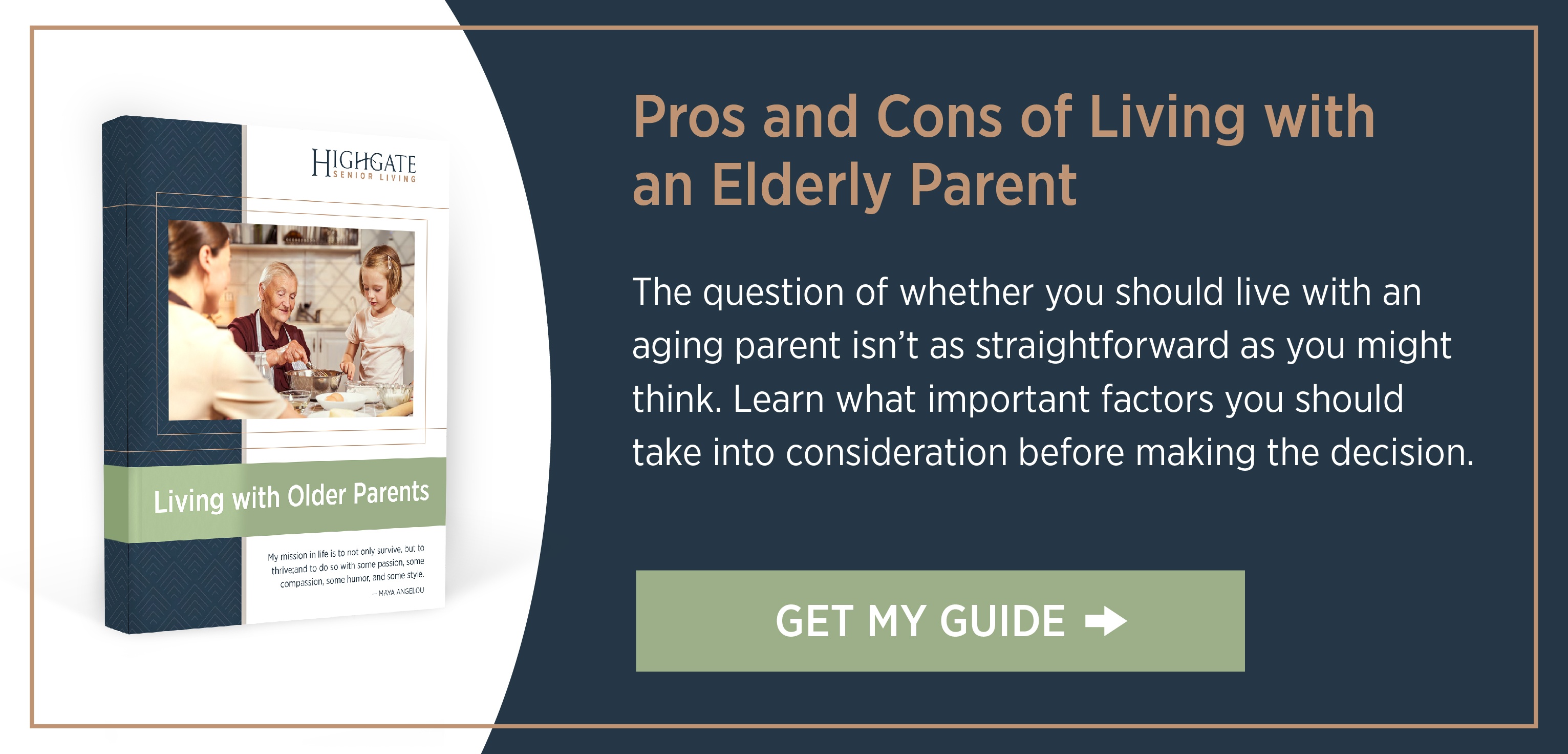
The decision to live with aging parents is a serious one because it affects the relationships within a family as well as the physical and mental health of everyone involved.
For some, the arrangement works out fine, and for most of human history, family members of all ages lived together. Perhaps when you were a child, your parents built or bought a home with separate quarters, and it was simply a given that Grandma would move in.
There are many pros to having two or even three generations residing in the same home. If you still have children living at home, it could be a beautiful opportunity for them to get to know your mom more and for her to form closer ties with your children.
However, many families jump right into moving in together only to discover that they actually don’t know how to live in a multigenerational home.
So what does it take to keep the harmony among family members when an aging parent moves in? Here are four things to consider.
How Well Do You Really Get Along?
One of the first questions you should ask yourself before moving your parent into the guest room is: How well do we really get along?
You don’t need to be best friends with your parent for cohabitation to work. But it certainly helps if you enjoy each other’s company and can successfully resolve your differences. For aging parents and adult children who get along well, living together can be a beautiful opportunity for you to know your parent in a new way and for your children to form close ties with their grandparent.
Even if your family dynamic has been largely positive in the past, try to anticipate potential changes that could result from this decision. For example, not every senior wants to live with their adult child. Although your parents are getting older and they might need a little more help than they once did, they are still adults. It can be challenging going from being the head of the household to taking on a secondary role in the home and feeling as if they’re being parented by their children. Will your parent accept your assistance? Will you be thrust back into your old role of son or daughter, with your parent constantly telling you what to do? Will they make you feel as though you never get it right and can never do enough to satisfy their needs?
If you and your parent have never really gotten along, don’t expect the relationship to magically change now. If you’re currently grinding your teeth after an hour and feel like running out the door each time your dad visits, then having him move in may not be a good idea. You may have the best intentions, but if you're both going to be miserable, it's probably wiser to pursue other options first.
How Will Caregiving Affect Your Marriage?
It is also important to reflect on your parent’s relationship with your partner. If your husband has never gotten along with your mother, for example, it is highly unlikely that their relationship would change for the better after she moves in.
Even if your partner and parent get along, caregiving will affect your relationship. Spouses often feel that caregiving comes to dominate day-to-day life, upending long-standing routines and dynamics. For example, social activities you once enjoyed can become difficult when you never know when you might have to switch back into “caregiver mode.” Your marriage might be tested if the lack of privacy and your loved one’s caregiving needs interfere with your time together. After a while, your spouse might start to resent this lifestyle change.
For Lisa, caring for her dad at her home with her husband, John, had a huge impact on her marriage. No more date nights. They could not leave the house together because it would mean Dad, James, was home alone. During the week, Lisa stayed home to care for James and John went to work. On the weekends, John stayed home with James so Lisa could go grocery shopping and get her hair cut.
“My husband would have to take time off so I could go and do stuff to take care of myself,” Lisa says. “And that made me feel guilty, too. I was worried about his job. I shouldn’t have to take care of myself, but you can’t not. If you’re not taking care of yourself, you can’t take care of anyone else.”
How Do Your Children Feel About It?
If you still have children in the home, they can be affected, too. Moving your loved one in will increase your responsibilities and your stress level immensely, and it could have a big impact on your parent-child relationship.
Consider how your parent’s presence will affect your family routine, activities, and privacy. Will the kids still have enough space? Will your parent respect your values with regard to your children and how you live your life? Will they set a good example for your children?
Your children might have to be convinced there is a great reason why their grandpa will be living with them, especially if they have to leave their room to share with another. The best way your children could benefit from your parent’s stay is if your parent is still relatively healthy and can do some chores, tell them stories, and help them with schoolwork.
Does Your Loved One Have Dementia?
Another thing to keep in mind is that Alzheimer's and other forms of dementia can change someone’s personality — for better or for worse. Will you be able to handle what happens when an illness like dementia progresses? The two of you may have always had a good relationship, but dementia might make your mom angry or paranoid in ways you’ve never seen before. On the other hand, your difficult dad could become very sweet. You just don’t know.
Another example: A parent with Alzheimer’s disease cannot be expected to reason with you when it comes down to respecting house rules and participating in chores and other household duties. If a loved one is facing the end of life, then it is very likely that this living arrangement will be temporary yet very emotionally intense.
Making the Decision to Move a Parent In
Each elder and family dynamic is different, so it’s challenging to predict what setting an aging loved one would prefer and whether everyone could cohabitate well.
As you can see, the question of whether you should live with an aging parent isn’t as straightforward as you might think. For a deeper dive into important factors to consider before cohabiting with your older parent, download our eBook.






